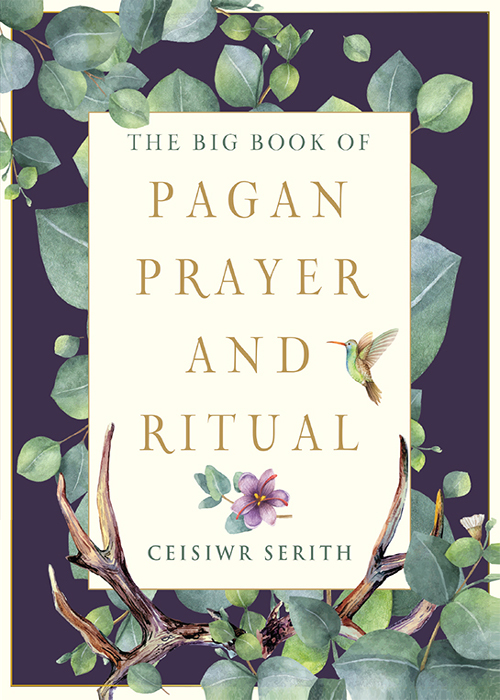
 For Hope,
For Hope,
who gives so much joy. This edition first published in 2020 by Weiser Books, an imprint of Red Wheel/Weiser, LLC With offices at: 65 Parker Street, Suite 7 Newburyport, MA 01950 www.redwheelweiser.com Copyright 2020 by Ceisiwr Serith All rights reserved. No part of this publication may be reproduced or transmitted in any form or by any means, electronic or mechanical, including photocopying, recording, or by any information storage and retrieval system, without permission in writing from
This edition first published in 2020 by Weiser Books, an imprint of Red Wheel/Weiser, LLC With offices at: 65 Parker Street, Suite 7 Newburyport, MA 01950 www.redwheelweiser.com Copyright 2020 by Ceisiwr Serith All rights reserved. No part of this publication may be reproduced or transmitted in any form or by any means, electronic or mechanical, including photocopying, recording, or by any information storage and retrieval system, without permission in writing from
Red Wheel/Weiser, LLC. Reviewers may quote brief passages. This edition is a collection of portions of these previously published titles:
A Book of Pagan Prayer (2018) and A Pagan Ritual Prayer Book (2011)
published by Weiser Books . ISBN: 978-1-57863-692-1 Library of Congress Cataloging-in-Publication Data available upon request. Cover design by Kathryn Sky-Peck Typeset in Times New Roman Printed in Canada MAR 10 9 8 7 6 5 4 3 2 1 www.redwheelweiser.com/newsletter
CONTENTS
ACKNOWLEDGMENTS
M any people helped in the writing of this book.
Those who have willingly suffered through the various rituals I've written while I honed my skills have gone above and beyond. Of these, I especially thank the members of my grove, Nemos Ognios. It was Neal Levin who, by suggesting the book's structure, gave me the idea of writing from the point of view of a ritual. I gladly thank my wife Debbie and my daughter Elizabeth for encouraging me and for providing me with an environment in which I could allow my thoughts to turn to religious matters. My time with two women who are so good with words has increased my own skill, and from the most personal point of view, most of what I know about the concerns of real people has come from them. Most especially, my wife has worked hard through the years, allowing me to take the time to discover that I could write.
I couldn't have done it without her.
INTRODUCTION
I hope this book is only the first in a long line of books of Pagan prayers that will come out of Paganism as it grows. Prayer is a subject that can never be exhausted. It's a conversation between us and the numinous. As long as there have been people, they have conversed with one another, and still they find things to talk about. Why should we expect sacred conversation to be any different? I wrote this book with several goals in mind.
First, to encourage others to use them, I wanted to explain why prayers and offerings matter. Second, I wanted to show people how they could write their own prayers. Third, I wanted to provide the Pagan community with a selection of prayers to use. There are short commentaries to some of the prayers in which I try to explain the Pagan deities, images, and myths and to indulge in a little theology. These commentaries also show the connection between myths, images, theology, and prayer, thereby helping you in the construction of your own prayers. I decided to forego an explanation of neo-Paganism itself, however.
There are already enough books out there that do that; I don't have much new to say on the basics. I will say, however, that I believe that Paganism is defined by its rituals rather than its beliefs, so readers will find my thoughts on the subject in the prayers. If you aren't familiar with the basics of neo-Paganism, don't worry; if you read the prayers and my commentaries, you will find the explanations you need. Although I've tried to be very careful with words in this book, I've sometimes used gods instead of deities or gods and goddesses when the flow of the language seemed to require it. I have even used the politically incorrect phrase gods and men. For this transgression, I can only ask you to put it beside deities and people and see which scans better.
The order of prayers in this book follows that of my second book rather than the first. I've found it to be more user friendly, one from which it's easier to form one's own rituals. The categories into which I have divided the prayers are not hard and fast. For instance, you can use a prayer of praise as an introduction to one of thanksgiving. Because of this, you shouldn't feel bound by the chapter titles. Feel free to mix and match, to change and edit, and indeed to make these prayers your own.
It is you who will be talking to the gods, and you are the one who will have to answer to them for what you say. Be clear. Be careful in how you pray. Take care how you come before the gods. Give them your best. Most forms of Paganism are unashamedly polytheistic, believing in a multitude of deities.
I myself believe in an effectively infinite number, although I personally worship only a few. With so many gods to choose from, it is obvious that I will only be able to address some. For those deities not represented here, some of these prayers can be adaptedor, at least, serve as models or inspiration for your own. A critique of my previous books has been that I didn't have enough prayers to deities from certain cultures, in particular Baltic, Slavic, and Near Eastern. This was a legitimate criticism that I've tried to correct in this version. There may, however, be deities I give prayers to that some don't consider deities at allor, at least, Pagan ones.
For instance, I give prayers to numina who in Zoroastrianism are considered Yazatas, who aren't exactly deities. I hope I don't offend any Zoroastrians by this, but the Yazatas I've written prayers to come, in a historical sense, from pre-Zoroastrian Pagan deities, and it is to them that the prayers are directed, not the Zoroastrian figures. I've chosen to use the standard spellings for deity names. In some cases, this results in scary things like Tva

 . Some of these are probably obvious, like Kri
. Some of these are probably obvious, like Kri
 a, but others not so much. In the glossary of deities at the back of the book, I've included alternate spellings that are sometimes found that, while not completely accurate, are good enough.
a, but others not so much. In the glossary of deities at the back of the book, I've included alternate spellings that are sometimes found that, while not completely accurate, are good enough.
For Proto-Indo-European deities, for which there are only the acceptable spellings, pronounce the vowels as in Latin or Italian. The Proto-Indo-European x is the sound at the end of Scottish loch, and accents simply mark accented syllables. The superscript w in Gwouwind and Perkw nos is a little trickier (and scarier), but you won't be too far wrong if you use gw and qu. The letter , found in several languages, is pronounced like English sh, like English ch, and like the s in measure (French j).
nos is a little trickier (and scarier), but you won't be too far wrong if you use gw and qu. The letter , found in several languages, is pronounced like English sh, like English ch, and like the s in measure (French j). 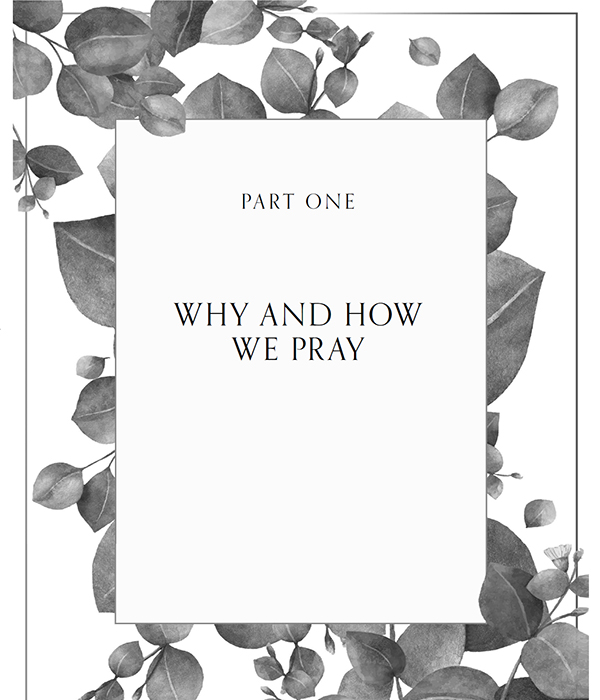
Chapter 1
THE ROLE OF PRAYERYESTERDAY AND TODAY
T hose of us who call ourselves Pagans owe a debt to all those who came before us. Before trying to define our own modern Paganism, therefore, we should find out as much as we can about what the ancient Pagans did.
Next page
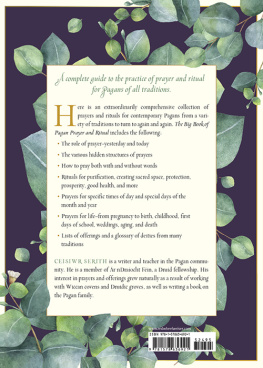
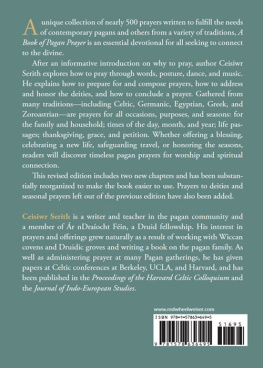


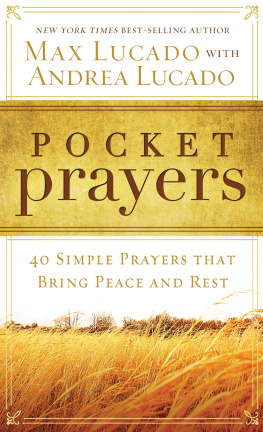
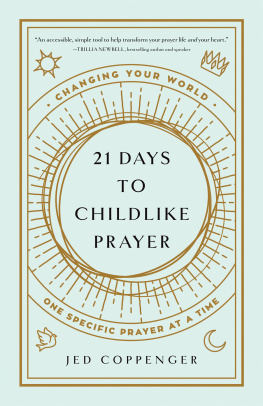


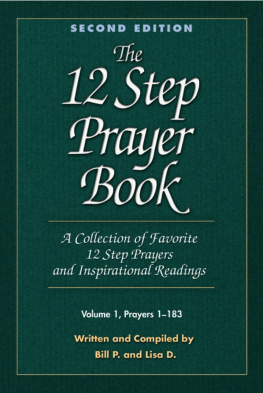
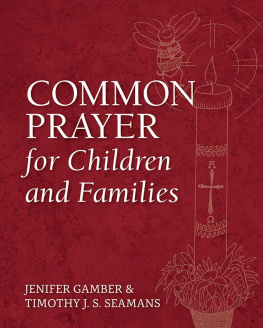


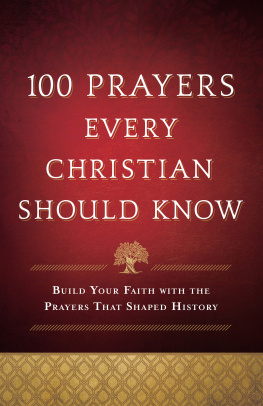

 For Hope,
For Hope, This edition first published in 2020 by Weiser Books, an imprint of Red Wheel/Weiser, LLC With offices at: 65 Parker Street, Suite 7 Newburyport, MA 01950 www.redwheelweiser.com Copyright 2020 by Ceisiwr Serith All rights reserved. No part of this publication may be reproduced or transmitted in any form or by any means, electronic or mechanical, including photocopying, recording, or by any information storage and retrieval system, without permission in writing from
This edition first published in 2020 by Weiser Books, an imprint of Red Wheel/Weiser, LLC With offices at: 65 Parker Street, Suite 7 Newburyport, MA 01950 www.redwheelweiser.com Copyright 2020 by Ceisiwr Serith All rights reserved. No part of this publication may be reproduced or transmitted in any form or by any means, electronic or mechanical, including photocopying, recording, or by any information storage and retrieval system, without permission in writing from

 . Some of these are probably obvious, like Kri
. Some of these are probably obvious, like Kri a, but others not so much. In the glossary of deities at the back of the book, I've included alternate spellings that are sometimes found that, while not completely accurate, are good enough.
a, but others not so much. In the glossary of deities at the back of the book, I've included alternate spellings that are sometimes found that, while not completely accurate, are good enough. nos is a little trickier (and scarier), but you won't be too far wrong if you use gw and qu. The letter , found in several languages, is pronounced like English sh, like English ch, and like the s in measure (French j).
nos is a little trickier (and scarier), but you won't be too far wrong if you use gw and qu. The letter , found in several languages, is pronounced like English sh, like English ch, and like the s in measure (French j). 